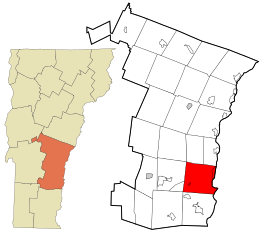Weathersfield, Vermont
| Weathersfield, Vermont | |
|---|---|
| Town | |
 Location in Windsor County and the state of Vermont. |
|
| Location in the United States | |
| Coordinates: 43°23′4″N 72°27′45″W / 43.38444°N 72.46250°WCoordinates: 43°23′4″N 72°27′45″W / 43.38444°N 72.46250°W | |
| Country | United States |
| State | Vermont |
| County | Windsor |
| Area | |
| • Total | 44.2 sq mi (114.5 km2) |
| • Land | 43.6 sq mi (113.0 km2) |
| • Water | 0.6 sq mi (1.5 km2) |
| Elevation | 1,237 ft (377 m) |
| Population (2010) | |
| • Total | 2,825 |
| • Density | 64/sq mi (25/km2) |
| Time zone | Eastern (EST) (UTC-5) |
| • Summer (DST) | EDT (UTC-4) |
| ZIP code | 05156 |
| Area code(s) | 802 |
| FIPS code | 50-77500 |
| GNIS feature ID | 1462247 |
| Website | www |
Weathersfield is a town in Windsor County, Vermont, United States. The population was 2,825 at the 2010 census.
The town of Weathersfield was named for Wethersfield, Connecticut, the home of some of its earliest settlers. The Connecticut town had taken its name, in turn, from Wethersfield, a village in the English county of Essex, the name of which derived from "wether", or in Old English wither, meaning a castrated lamb. In England, wethers were trained to lead flocks of ewes to pasture. It was a supreme irony that the name of the Vermont town (with an 'a' inserted) would derive from a connection to sheep, the animal that would come to define Weathersfield's earliest antecedents and first put it on the map.
The man responsible for that feat was a native of Boston who had become a European trader. William Jarvis was appointed by President Thomas Jefferson as U.S. Consul General to Portugal, after founding a trading house in Lisbon. In 1811 Jarvis imported from Spain to his farm at Weathersfield Bow the first Merino sheep brought to America. Jarvis set aside eight of the 4,000 Merino sheep he imported as gifts to former President Jefferson and to President James Madison.
"I cannot forbear, Sir," Jarvis wrote to Jefferson, "making you an offer of a Ram & Ewes, both as a mark of my great esteem & well knowing that the experiment cannot be in better hands." Jarvis was a wealthy financier and gentleman farmer who had bought up most of the flood plain of Weathersfield. Jarvis was also one of the most prominent Republicans in the Connecticut River Valley. Thanks to his introduction of Merino sheep, he provided the underpinning for Vermont agriculture for the next century.
...
Wikipedia

